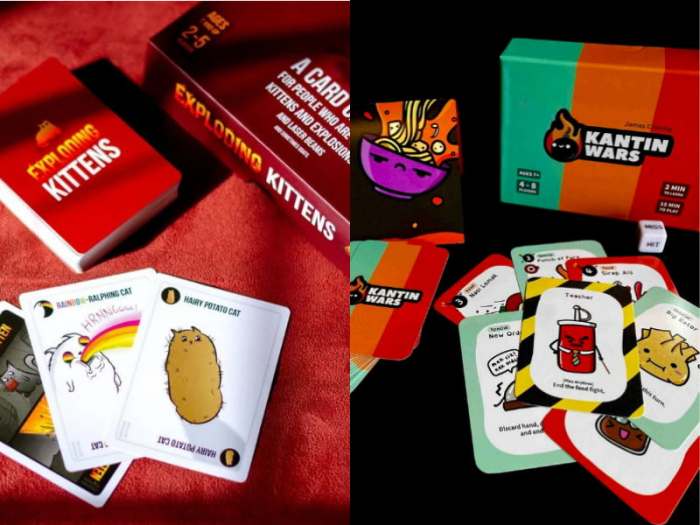
As Best tips for family-friendly card games takes center stage, this opening passage beckons readers into a world crafted with good knowledge, ensuring a reading experience that is both absorbing and distinctly original. From the benefits of playing to handling challenges and incorporating learning opportunities, this guide offers a comprehensive look at making family game nights enjoyable and memorable.
Introduction to Family-Friendly Card Games
Family-friendly card games are those that are suitable for players of all ages, making them enjoyable for both children and adults. These games often have simple rules, quick gameplay, and are designed to be fun and engaging for the whole family.
Family-friendly card games have gained popularity as they provide a great way for families to spend quality time together, bond, and have fun. They offer a break from screens and technology, allowing for face-to-face interaction and socialization among family members.
Examples of Popular Family-Friendly Card Games
- Uno: A classic card game where players try to be the first to get rid of all their cards by matching them by color or number.
- Go Fish: A simple and fun game where players try to collect sets of four cards by asking opponents for specific cards.
- Exploding Kittens: A strategic game where players draw cards with the goal of avoiding the exploding kitten card.
- Sushi Go!: A fast-paced game where players draft sushi dishes to create the best meal possible.
Benefits of Playing Family-Friendly Card Games
Playing card games as a family can offer numerous benefits that go beyond just entertainment. These games can help strengthen family bonds, promote communication, and even have educational value.
Promotes Bonding Among Family Members
Card games provide an opportunity for family members to spend quality time together, engage in friendly competition, and create lasting memories. The interactive nature of card games encourages communication, teamwork, and cooperation among players, fostering a sense of togetherness within the family.
Educational Benefits
Family-friendly card games can also have educational benefits, especially for children. These games can help improve critical thinking skills, enhance memory retention, and develop strategic planning abilities. Additionally, card games can teach important concepts such as math skills, logic, and problem-solving in a fun and engaging way.
Best Practices for Choosing Family-Friendly Card Games

When selecting family-friendly card games, it’s important to consider a few key factors to ensure everyone can enjoy the game. From age-appropriate options to finding engaging yet simple games suitable for all ages, here are some best practices for choosing the right card games for your family.
Age-Appropriate Options for Different Family Members
- Consider the age range of your family members when choosing card games. Look for games that have age recommendations on the packaging to ensure they are suitable for everyone.
- Opt for games that have adjustable difficulty levels or rules that can be adapted to accommodate younger players.
- Choose games that offer a balance of challenge and fun for all age groups, so everyone can participate and enjoy the game together.
Finding Engaging Yet Simple Card Games Suitable for All Ages
- Look for card games that are easy to learn and quick to play, especially if you have younger children in the family.
- Consider games that involve a mix of luck and strategy to keep players of all ages engaged and entertained.
- Explore different genres of card games, such as matching games, strategy games, or cooperative games, to find options that appeal to everyone’s interests.
Engaging Gameplay Ideas for Family-Friendly Card Games

Adding a twist to traditional card games can make family game nights more exciting and enjoyable for all participants. Here are some creative ideas to enhance gameplay:
Customized Rule Variations
Consider introducing customized rule variations to suit the skills and interests of younger players. For example, you can implement a rule where younger players get an extra turn or receive special bonuses to level the playing field without compromising the fun for adults.
Themed Game Nights
Host themed game nights where the card games align with a specific theme or storyline. This can add an element of creativity and immersion to the gameplay, making it more engaging for players of all ages.
Collaborative Gameplay
Encourage collaborative gameplay by introducing card games that require teamwork and cooperation. This can foster communication and bonding among family members while ensuring a fair and inclusive gaming experience.
Dealing with Challenges in Family-Friendly Card Games
Family card game sessions can sometimes face challenges that may disrupt the fun and harmony among players. It’s essential to address these issues promptly to ensure everyone enjoys the game. Here are some strategies to handle common challenges and create a positive gaming environment for all players.
Handling Competitiveness or Disagreements
- Encourage sportsmanship: Emphasize the importance of fair play, respect for others, and gracious winning or losing.
- Set ground rules: Establish clear rules at the beginning of the game to prevent misunderstandings and disagreements.
- Take breaks: If tensions rise during gameplay, suggest taking a short break to cool off before resuming the game.
- Rotate game hosts: To avoid conflicts, rotate the responsibility of hosting or choosing games among family members.
Creating a Positive and Inclusive Environment
- Choose games suitable for all ages: Select card games that are enjoyable and engaging for players of different ages and skill levels.
- Encourage teamwork: Include cooperative games where players work together towards a common goal, fostering collaboration and unity.
- Celebrate achievements: Acknowledge and celebrate each player’s successes, no matter how big or small, to boost morale and motivation.
- Provide feedback constructively: Offer constructive feedback in a positive manner to help players improve their skills without discouraging them.
Incorporating Learning Opportunities in Family-Friendly Card Games
Card games are not only a source of entertainment but can also serve as valuable educational tools for children. By incorporating learning opportunities in family-friendly card games, parents can help their kids develop essential skills while having fun.
Teaching Valuable Skills and Concepts
Family-friendly card games offer a unique platform to teach children various skills and concepts. For example, games like “Uno” can help kids enhance their color recognition and number skills, while “Go Fish” can improve memory and social interaction.
Cognitive Benefits of Playing Card Games
- Improves critical thinking and problem-solving skills
- Enhances memory retention and recall abilities
- Promotes strategic planning and decision-making
Examples of Educational Card Games
There are numerous educational card games available that are both fun and enriching for family game nights. Games like “Math War” can help kids practice basic math operations, while “Scrabble Slam” can enhance vocabulary and spelling skills. These games not only provide entertainment but also facilitate learning in a playful manner.
Making Family-Friendly Card Games a Regular Tradition
Establishing regular family game nights centered around card games can be a wonderful way to create lasting memories and strengthen family bonds. Consistency is key in promoting togetherness and ensuring that everyone looks forward to these special gatherings. Here are some tips to make family game nights enjoyable and memorable for all participants:
Set a Schedule
- Choose a specific day and time each week for family game night to create a routine that everyone can count on.
- Consider rotating the responsibility of choosing the game among family members to keep things interesting.
Create a Comfortable Environment
- Designate a cozy and inviting space in your home for game nights, free from distractions like electronic devices.
- Provide snacks and beverages to enhance the overall experience and make it a fun and relaxing time for everyone.
Select a Variety of Games
- Include a mix of classic card games and newer options to cater to different preferences and skill levels within the family.
- Rotate the selection of games regularly to keep the excitement alive and prevent boredom.
Encourage Participation and Sportsmanship
- Emphasize the importance of good sportsmanship and respectful competition among family members.
- Encourage everyone to participate and try their best, regardless of their skill level or previous experience with card games.
Handling Card Game Etiquette and Sportsmanship
Good sportsmanship and etiquette are essential in family-friendly card games to ensure a positive gaming experience for everyone involved. Teaching children about fair play, respect, and gracious winning or losing not only enhances their social skills but also promotes a sense of camaraderie within the family.
Importance of Good Sportsmanship
Emphasizing the importance of good sportsmanship in card games helps children understand the value of playing by the rules, showing respect for opponents, and maintaining a positive attitude regardless of the outcome. It fosters a sense of integrity and fairness, teaching valuable life lessons that extend beyond the game table.
Tips for Teaching Children
- Lead by example and demonstrate good sportsmanship in your own gameplay.
- Encourage children to congratulate opponents on their victories and offer a handshake or high-five after each game.
- Discuss the concept of fair play and emphasize the importance of playing honestly and ethically.
- Remind children that it’s okay to lose and to show appreciation for the opportunity to play.
Handling Rule-Breaking or Etiquette Issues
When family members struggle with following game rules or etiquette guidelines, it’s important to address the situation calmly and constructively. Offer gentle reminders about the rules and etiquette expectations, focusing on positive reinforcement rather than criticism. Encourage open communication and a willingness to learn from mistakes, fostering a supportive and inclusive gaming environment for all players.
In conclusion, Best tips for family-friendly card games not only provide a fun way to bond with family members but also offer numerous benefits for all ages. By following the practices Artikeld in this guide, you can ensure that your family game nights are filled with laughter, learning, and lasting memories.
FAQ Resource
How can I ensure that the card games are suitable for all family members?
Consider the age range of your family members and look for games that offer varying levels of complexity to keep everyone engaged.
What are some ways to handle disagreements during family card game sessions?
Encourage open communication, establish clear rules for resolving conflicts, and focus on the spirit of friendly competition rather than winning.
Are there any educational benefits to playing family-friendly card games?
Absolutely! Card games can help improve cognitive skills, enhance critical thinking, and even teach valuable life lessons in a fun and interactive way.





